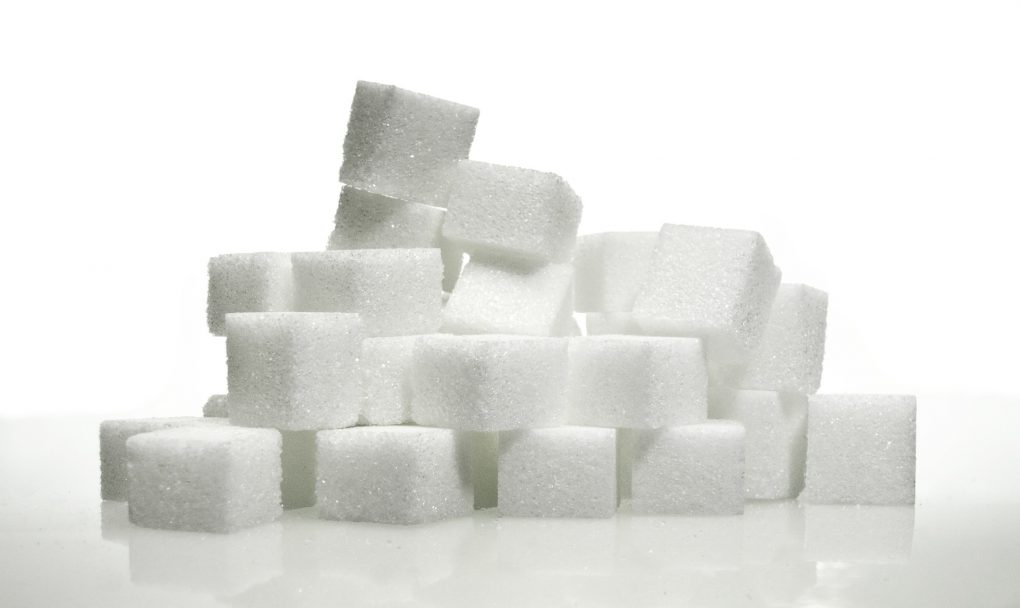
Sugar: Your Friend or Foe?
Nowadays, sugar is one of the most commonly consumed food product. It is added to virtually everything: coffee, tea, water, ketchup, mayonnaise, yogurt, or even cold cuts. Not to mention sweets. But is this amount of sugar safe for us? You’re about to find out in today’s post.
A gradual increase of sugar consumption has been observed in recent years. In Poland, sugar intake per capita in 1950 amounted to 21 kg, while by 2007 it had increased to almost 40 kg. Studies have shown that the main source of simple sugars in our diet are fizzy and energy drinks, followed by cereal desserts, fruit drinks, milk desserts, sweets, tea, sugar, and honey.
Sweet drinks – the main source of simple sugars
As mentioned above, sweet drinks are the main source of simple sugars in our diet. It has been shown that the amount of energy supplied from sweetened drinks increased in the years 1970-2006 from 64.4 kcal to 141.7 kcal per day. It has also been calculated that adding an extra portion of energy drink to your daily diet will increase your body weight by almost 7 kg per year. Research study from the Institute of Food and Nutrition shows that the average consumption of sweetened carbonated drinks in Poland is 43 ml / person / day. Boys and young men consume the largest amounts, although the consumption in women is also relatively high. Sweetened drinks contain about 6-10 g of simple sugars per 100 ml. It is worth emphasizing that fruit juices contain only natural carbohydrates, while sugar is added to fruit drinks. One can of sweetened drink may contain up to 15-40 g of added sugar, i.e. 3-8 teaspoons.
Sugar – the source of “empty calories”
Sugar is a high-energy product that consists almost exclusively of pure sucrose. As much as 405 kcal is contained in 100 g of sugar. In addition to energy, sugar does not provide the body with any nutrients it needs, and sugar-rich foods are usually low in other ingredients, such as vitamins and minerals.
Is excess sugar the cause of obesity epidemic?
Recently, the role of white sugar in the development of overweight and obesity has been increasingly emphasized. Studies have shown that as the consumption of white sugar increased worldwide, the incidence of obesity increased, too. High sugar intake can also contribute to the complications associated with obesity. It has been observed that excess sugar in the diet can lead to the development of lipid disorders, manifested by an increase in triglyceride levels. It has also been shown that high sugar consumption is associated with an increase in blood pressure and the development of insulin resistance. Emerging metabolic disorders can in turn accelerate the development of atherosclerosis and cardiovascular diseases.
Sugar – the main cause of caries
The correlation between the frequency of consumption of sweetened products and the risk of developing tooth decay is a common topic in scientific literature. Caries and premature tooth loss are more often seen in children eating sweets several times a day than in those who rarely reach for these types of products. Products and drinks rich in carbohydrates contribute to a sharp decrease in the pH of the oral cavity, which subsequently initiates the process of enamel demineralization.
High sugar intake and constipation
High intake of simple sugars can also have a negative effect on bowel function, which may result in a greater predisposition to constipation. The reason for this is usually a low fiber supply, which is often accompanied by an oversupply of simple sugars. Let me remind you that dietary fiber regulates the frequency and rhythm of bowel movements by accelerating the intestinal passage and increasing the volume of stool.
Sugar and candidiasis
Sugar can also disturb the balance of physiological bacterial flora, which can lead to the development of mycosis of the digestive system. Changes in the bacterial flora may also cause a decrease in your body’s immunity.
Sugar and cancer risk
Excess sugar intake may also increase the risk of developing cancer. Studies carried out so far have shown in particular the relationship between the consumption of products with a high glycemic index and an increased risk of developing gastrointestinal (e.g. colorectal) tumors, as well as breast, ovarian and uterus cancers.
The effect of sugar on mood
High consumption of simple sugars has been shown to cause chronic fatigue. Sugar, by causing sudden fluctuations in blood glucose, can also adversely affect the nervous system, causing hyperactivity of the body, impaired concentration, irritability, low mood and drowsiness.
Sugar is addictive!
We must also remember that sugar is addictive! Over time, we need more and more of it. In extreme situations, this addiction is as difficult to get rid of as alcohol addiction. You can find more information on addiction to sugar here.
How to replace white sugar?
If you care about health and well-being, the evidence I have shown you above should be enough to make the decision to cut out sugar from your diet. If you find it difficult to give it up completely, you should at least try to limit the amount or choose a healthier alternative. In my cooking, I use coconut sugar instead of white sugar. Coconut sugar is obtained from coconut palm juice. It has a deep brown color and an intense caramel aroma. It is less sweet than white sugar, and when added to dishes, it gives them a unique, slightly coconut flavor and a pleasant aroma. It is also more rich in nutrients compared to white sugar, e.g. it contains B vitamins and potassium. It is also a source of iron and calcium. Coconut sugar also has a lower glycemic index (GI = 35) than white sugar. It is a source of inulin, which supports the proper functioning of the digestive tract. Its advantages include low melting point and high burning temperature, which makes it great for baking. I also use it as an addition to cocktails and Asian dishes.
Bibliography:
- Berkey CS, Rockett HRH, Field AE, et al. Sugar-added beverages and adolescent weight change. Obes Res 2004, 12: 778-788.
- Johnson RK, Appel IJ, Brands M, et al. On behalf of the American Heart Association Nutrition Committee of the Council on Nutrition, Physical Activity, and Metabolism and the Council on Epidemiology and Prevention. Dietary sugars intake and cardiovascular health: a scientific statement from the American Heart Association. Circulation 2009, 120: 1011-1020.
- Kavey R-EW. How sweet it is: sugar-sweetened beverage consumption, obesity, and cardiovascular risk in childhood. J Am Diet Assoc 2010, 110, 10: 1456-1460.
- Kłosiewicz-Latoszek L. Jaka ilość cukru jest bezpieczna dla zdrowia? Online: https://ncez.pl/abc-zywienia-/zasady-zdrowego-zywienia/jaka-ilosc-cukru-jest-bezpieczna-dla-zdrowia-
- Malik VS, Popkin BM, Bray GA, et al. Sugar-sweetened beverages, obesity, type 2 diabetes mellitus, and cardiovascular disease risk. Circulation 2010, 121: 1356-1364.
- Malik VS, Schulze MB, Hu FB. Intake of sugar-sweetened beverages and weight gain: a systematic review. Am J Clin Nutr 2006, 84: 274-288.
- Palou A, Bonet ML, Pico C. On the role and fate of sugars in human nutrition and health. Introduction. Obesity Rev 2009, 10, suppl. 1, 1-8. 8.
- Van Horn L, Johnson RK, Flickinger BD, et al. Translation and implementation of added sugars consumption recommendations: a conference Report from the American Heart Association. Added Sugars Conference 2010. Circulation 2010, 122: 2470-2490.
- Vartanian LR, Schwartz MB, Brownell KD. Effects of soft drink consumption on nutrition and health: a systematic review and meta-analysis. Am J Public Health 2007, 97: 667-675.










Comments No Comments
Join the discussion…